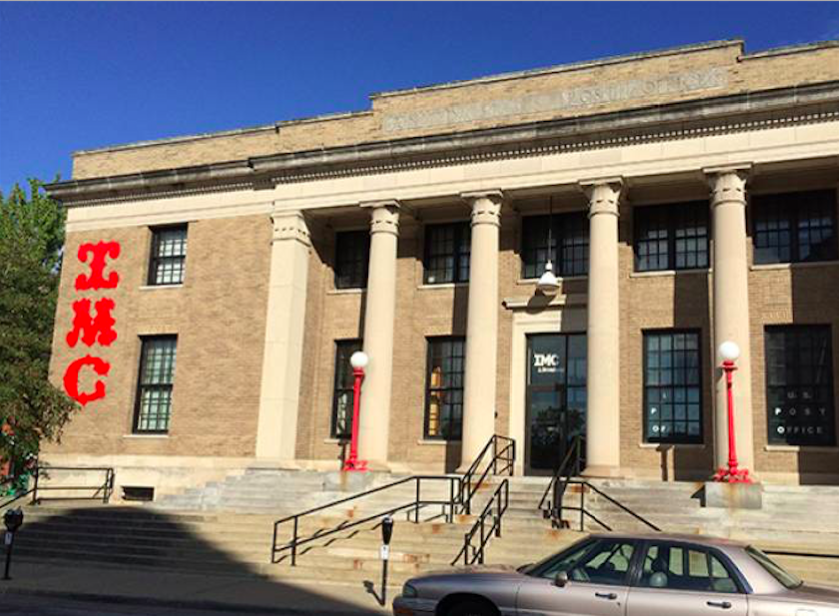There’s a 3-day party brewing this weekend in Downtown Urbana that’s likely to have something to entice you to come out — music, theater, art-making, food, urban gardening, learning how to stream live radio, brainstorming a growing community center in the downtown post office building — and soaking in some rich history with local adventurers. The centerpiece is the 15th-year anniversary of the founding of the Urbana Champaign Independent Media Center by a feisty group of activists who got a grassroots kickstart in 1999 for big ideas about free speech and media, independent of mainstream corporate sources. Those were the days before blogs, tweets, and instant access for anyone to get the news out on their smartphone. Media required equipment and expertise.
The inspiration was brought home by a delegation of 17 locals who joined in what became the Battle of Seattle in the protests organized to disrupt the 1999 meetings of the “ministerial conference” of the World Trade Organization. The original “independent media center” was a storefront popup organized by savvy international activists who had been planning a full year for their strategies in Seattle. They knew they’d need to report themselves on what was happening, because mainstream media is largely funded by the giant corporations who are the backbone of the economic order behind the WTO — and they wouldn’t want to broadcast widespread challenges to their authority.
The power and glory of that original storefront IMC, producing print, audio and video daily during the chaos of the Seattle events, ignited the energies of an unlikely collaboration back here at home — artists, activists, labor organizers, socialists, university academics — who were alarmed by increasing racial and economic divides in Urbana Champaign and fewer local voices as a result of media consolidation. Their dream was, and is, to establish a space where community members of all kinds can come together to make their own answers to social and economic problems. The IMC has always put particular emphasis on creating a space where youth can gather, share music, and give voice to their concerns.
And so in a remarkable confluence of focus, the group established the Urbana Champaign IMC, one of a node of 200 that grew up in the years after Seattle on every continent but Antarctica. They rented an old print shop at 218 West Main Street, pooled the equipment that was needed then to produce radio, print and video, got nonprofit status, and after five years raised the money to buy – yes, actually BUY — the 1914 post office building. Who would imagine a partnership between the U.S. Postal Service and advocates for free speech across every medium. The USPS required that its purchaser allow the downtown post office to stay open as a branch office rent-free — in a location more accessible than their newly-built High Cross Road mega-facility.
There’s a rich history here, and reasons for our community to be proud of the anchor the UCIMC has served for the global network. This weekend you can hear and help expand on that narrative as groundwork for the mission of the IMC as it expands beyond the original requirements for equipment and a physical location to make news.
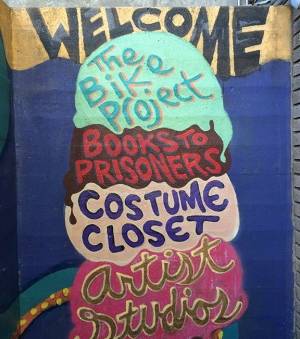
The UCIMC is made up of working groups of mostly volunteers who run an impressive array of programs within the building — WRFU 104.5FM, The Bike Project, Books to Prisoners, the Public i, Makerspace Urbana, a performance venue and art gallery — all joining together to celebrate the tenth anniversary of the building purchase. On Saturday afternoon they’ll open their doors to share the fun of what they love to do.
And so what’s the line-up this weekend?
Friday night kicks off at 5:30 with art-making workshops. With a rich store of artists’ studios, artist-in-residence Travis Hocutt, and gallery space there’s sure to be a lot going on. The UCIMC hosts a mega-collection of zines and zine-making material, and is itself a living and growing piece of art, with a new mural being painted as I write, to highlight the handicap accessible entry on the south side of the building. Artist Maya Bauer and her crew are working hard to get it done for the party.
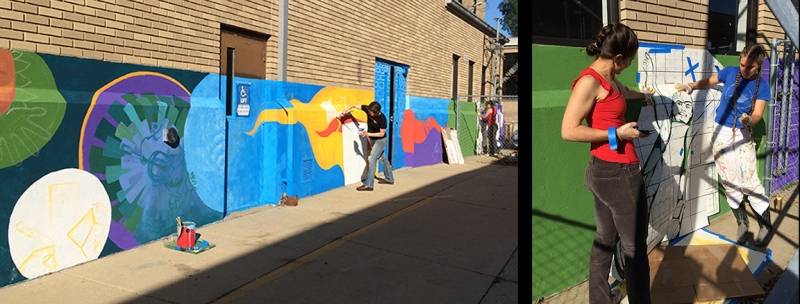
At 7:30 p.m. Friday night, the School for Designing a Society will get the energy rolling with a performance of their kid-centric environmental activist play Pester Power.
Saturday opens between 9 a.m. and noon with what the IMC is best at: working groups doing what they enjoy the most. Three tracks will offer the chance to dip in: with media techies, who are masterminding the set-up for radio station WRFU 104.5 FM to stream live; a green group will be gardening around the base of the radio tower and working on improvements for the outdoor space; and the information geeks will be archiving materials around the history of the IMC.
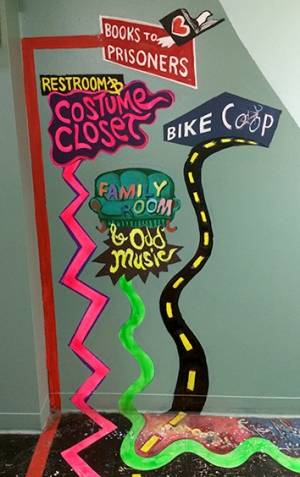
From 11:30 a.m.-1 p.m. you can buy a catered lunch and participate in a panel discussion on “What is needed now from a Community Media & Arts Center in C-U?” One of the panelists is Latrelle Bright, newly appointed Program Director of the IMC.
From 1-3 p.m. all the working groups will be on hand for a full open house, descriptions below.
From 3-5 p.m. hear from founding members Danielle Chynoweth and Sascha Meinrath, both deeply involved in media policy issues on the national and international frontiers. They will talk about the “Future of the IMC & Independent Media.”
Then get ready to party, with a sliding scale entry fee for a wine and cheese mixer at 6:30 p.m. and Spoken Word performance at 7:30 p.m. by T.R.U.T.H. and Exposed.
And on Sunday morning beginning at 10 p.m., you can brainstorm with the best over breakfast, on “Launching the Next 15 years of the IMC.” The festivities close at noon.
Here’s a tour of the working groups who will welcome you Saturday from 1-3 p.m.
Let’s start from the outside in. 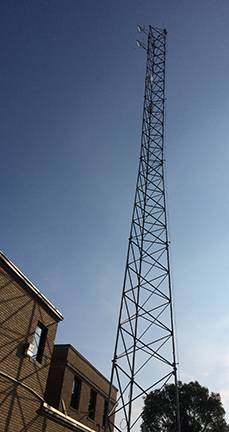 Yes, that is a radio tower poking up over the south side of the building. That puts out the signal for WRFU 104.5 FM, our very own low-power FM community access radio station, open to anyone who wants to do real local broadcasting.
Yes, that is a radio tower poking up over the south side of the building. That puts out the signal for WRFU 104.5 FM, our very own low-power FM community access radio station, open to anyone who wants to do real local broadcasting.
In January 2000, the Federal Communications Commission created the Low Power FM (LPFM) radio service, awarded by application for noncommercial educational broadcasting. One of the central founders of the IMC, Mike Lehman, active with labor and the Socialist Forum, was determined to expand the diversity of voices in local media. It took four years to acquire a low power license in 2004; and with the Prometheus Radio Project the tower went up in a community barnraising in 2005. The range for low-power stations is generally no more than 3.5 miles, but this Saturday the tech working group will be masterminding on-line streaming so the station will be fully accessible on the internet. Check out programming at WRFU — that’s Radio Free Urbana; you may be inspired to add your voice.
Stop by the Zine Library and admire the immense archives!
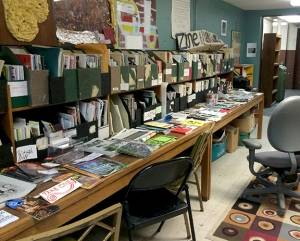
Hands-on tech is open to anyone in the basement home of Makerspace Urbana, celebrating its tenth anniversary this weekend. Over the years they’ve become the busy stewards of two 3-D printers, a vinyl laser-cutter, welding stations and drills for electronics, six sewing machines, an embroidery machine, a serger, and even a button-maker. It’s all open for free community use under the considerable expertise of volunteers who simply love to put their minds and their hands to the challenges of Making Things. They are happy to explore microelectronics and microcontrollers, mesh routers and computer networks, and have even dabbled in beer brewing and pewter casting. Check their website for expanded hours for their annual Halloween Sew-o-ween to help those secret superheroes out there dream up awesome costumes — even wired for light!
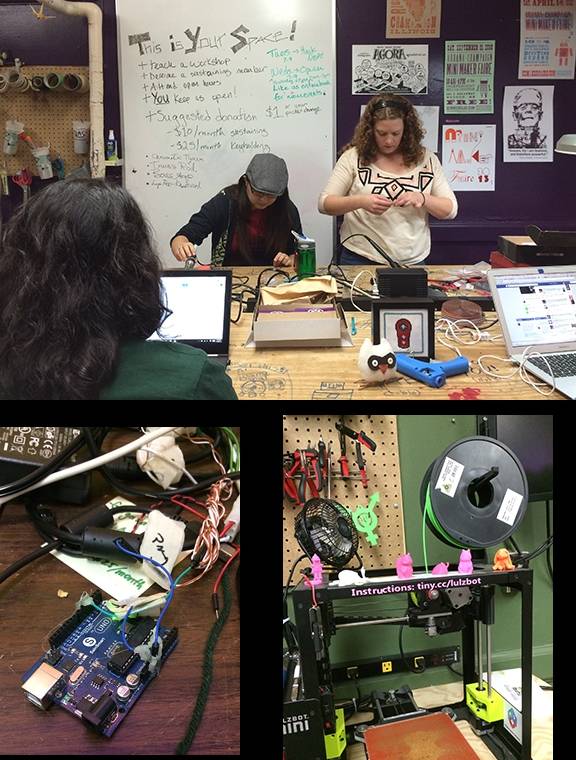
Weekly open hours are Saturdays 11 a.m.-1 p.m. and Wednesdays 7-9 p.m., with a Python users group monthly on Tuesdays — to teach open source programming skills that can do a powerful range of high-level computing. On Sundays they offer a computer help desk from 2 to 4. It is all volunteer staffed, free to anyone who walks in the door with a problem or an idea: a playground truly Of the People, By the People, and For the People.
Don’t stop there. Perhaps the best known around town of the DIY hubs at the IMC is The Bike Project. Their basement IMC location is the original one, so popular it expanded to include a shop on campus. This offers 2000 square feet crammed with salvage bikes, parts, tools, and six heavy duty Park stands. Open hours are Tuesdays and Thursdays from 6:30 to 9:00 p.m. and Saturdays and Sundays from 2-5 p.m. They offer “Ladies and Trans hours” twice a month; hold general meetings and like to extend their fun into the community with special events like Cranksgiving and the Mustache Ride. A membership fee allows free working time and most important, the expertise of the volunteers who staff open hours.
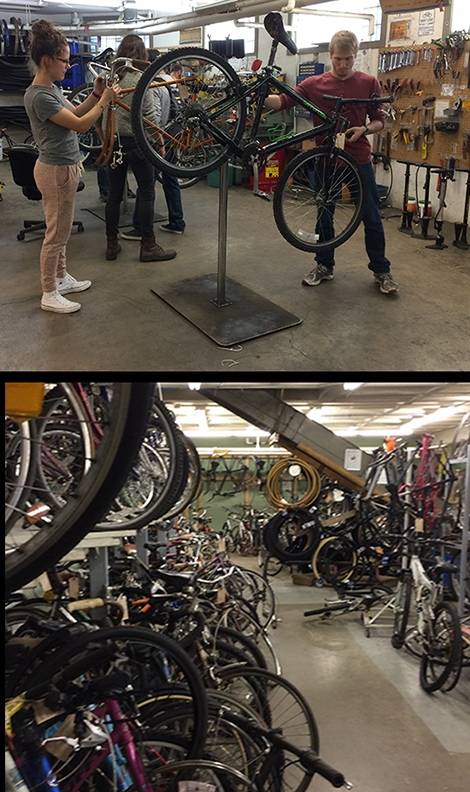
There are rich collaborations between working groups at the IMC. One enterprising member of The Bike Project needed a specific part, designed it with the help of Makerspace masterminds and printed it out in 3-D down the hall. See what’s possible when great minds work together?
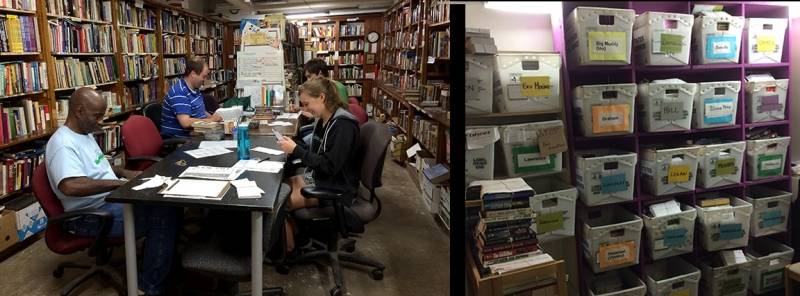
Books to Prisoners found the perfect home in the basement of the IMC ten years ago, in a giant room fully lined with mail-sorting shelves that precisely fit their needs. It’s well staffed by over 500 volunteers made up of regulars, with additional volunteer days, and a number of campus groups and churches, coordinated by staffer Lolita Dumas. Social justice is a firm part of the IMC, so it’s natural to provide educational resources to those serving time in Illinois prisons. This group was inspired by a local student in 1999 who attended a group in Indiana and came home with a handful of book requests from people incarcerated in Illinois. He readily found a circle of people wanting to pitch in, and they started collecting surplus in this book-loving town. They continue to negotiate the labyrinth of prison administrations to find out just what books can be mailed to prisoners and how they can be received. They first rented a room at the Illinois Disciples Foundation at the corner of Springfield and Matthews — the original home of Common Ground Food Coop — but outgrew that quickly, and happily became an engine of a working group at the downtown IMC. As of this week, B2P has sent free 112,072 books in 32,758 packages to 16,879 inmates in 25 state and 4 federal prisons in Illinois. In addition, they have assembled and staff two lending libraries in Champaign county jails, hosted Prison Arts Festivals, and numerous other outreach activities over their ten+ years.

You’re surely familiar with the print presence of the IMC, The Public i, distributed through town in 3,000 copies of 10 issues a year. It’s been a strong presence of the IMC since its beginning, with on-line archives available going back to 2001. Check them out for a useful cross-section of topics of interest in town – from a prescient piece in August 2001 on “Walmart and the Environment” to the current issue including Amira Davis’ article, “Culture, Liberation, and #BlackLivesMatter.” All the writers are volunteers, providing independent views on issues of local and wider concern. And like the rest of the groups at the IMC, it welcomes anyone to write who has an idea and is willing to research and write an article. The editorial and production team assembles the offerings and prints 3,000 copies ten times a year, free in their newsstands around town. Over 225 editions have come out since it was founded.
The Arts have been a central part of the UCIMC from its beginnings in the street theater performed by Urbana’s School for Designing a Society in Seattle in 1999. 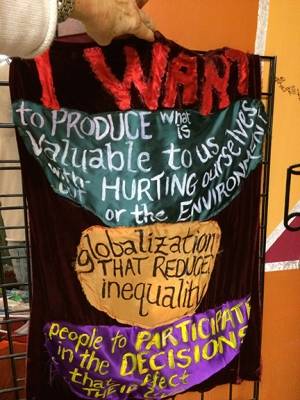 The original mission was to establish a place “where the power of art to transform our community could be realized.” From the beginning, political art, music and performance with tech providing sound and lights, have fueled the energies that cross age groups, and provide a space for teens to come together and find their voice. One of the many collaborations hosted at the IMC has been the chance for “youth correspondents” to learn radio skills at WRFU radio, Outta the Mouths of Babes. Here’s a view of the Costume Closet, clothes available on loan to anyone who wants an unexpected accent for their wardrobe, or would like to learn to embellish what they already have.
The original mission was to establish a place “where the power of art to transform our community could be realized.” From the beginning, political art, music and performance with tech providing sound and lights, have fueled the energies that cross age groups, and provide a space for teens to come together and find their voice. One of the many collaborations hosted at the IMC has been the chance for “youth correspondents” to learn radio skills at WRFU radio, Outta the Mouths of Babes. Here’s a view of the Costume Closet, clothes available on loan to anyone who wants an unexpected accent for their wardrobe, or would like to learn to embellish what they already have.
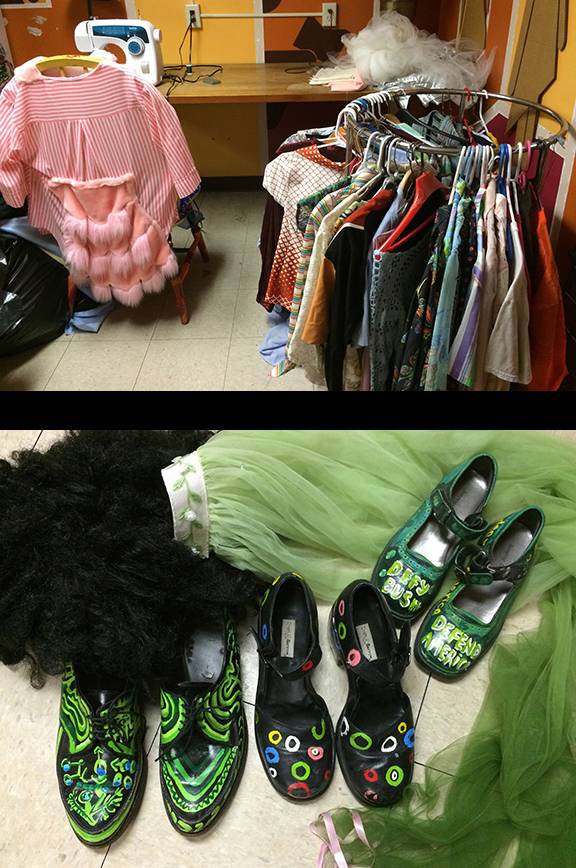
A number of artists have always rented studio space at the IMC, and now regular gallery shows are curated by artist-in-residence Travis Hocutt. With a grant from the city of Urbana, he brings in a wide range of artists-with-a-message, from Centennial High School students to the most recent show, “Renegades: Storytelling in Two Dimensions,” featuring ACE-award winner Nina Paley, Damian Duffy and Grant Thomas.
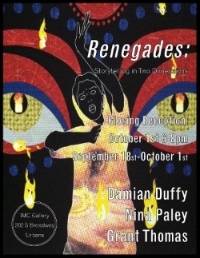
Hocutt has taught and exhibited in shows around the world; his interests include photography, modeling, bookmaking, and exploring photographic processes from before the Civil War. Visit his website for an idea of his own work, and enjoy the wide range of community groups he brings in to the gallery space. He’s putting together a swath of art, posters, and historical images for the weekend anniversary of the IMC.

There are many reasons to explore and appreciate the history of the UCIMC. There’s an immense offering of activities in the building, some related to the mission of the IMC, like C-U Citizens for Peace and Justice. Some groups simply rent the space for community use, including a local church and hair salon. Follow upcoming activities at the IMC through Facebook, including the October 17th 12–5 p.m. Books to Prisoners mega book sale; and on October 18th a book talk and discussion between Steven Salaita and Robert Warrior around “Uncivil Rites: Palestine and the Limits of Academic Freedom.”
Most of the global IMCs are no longer up and running, because the technology for broadcasting news is now readily available to anyone. But our IMC is uniquely long-lived because Sascha Meinrath, one of the founders, insisted on establishing non-profit status so that the IMC could apply for grants and take in and dispense funds. Sascha has moved on to make national and international waves, as lead of his own company the XLab, which works toward digital equity through policy, technology and innovation, and assessment of risks in the digital world.
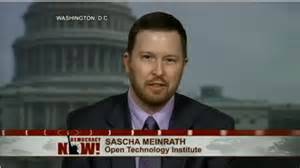
Meinrath will be coming to town from his offices in Washington, D.C. to speak on Saturday afternoon with Danielle Chynoweth, leading visionary of the IMC from her days on the ground in Seattle in 1999. She also has moved into national and international arenas of work with media in her role as Organizing Director of the Center for Media Justice based in Oakland, CA.
There is a remarkable store of creative thinking, invention, determination, and just-plain community spirit resident in our UCIMC. Come join in this weekend and help lay the groundwork for the next phase of the UCIMC as part of the vibrant hub growing in downtown Urbana.
A note on this article: The history of the UCIMC is made up the efforts of many many individuals, many of whose names have disappeared in the mists of time. In the interests of focusing on activities rather than people I have kept names to a minimum.
Cope Cumpston be writing more about particulars of the UCIMC’s history, the global IMC movement, and local working groups in other articles to follow in Smile Politely.








